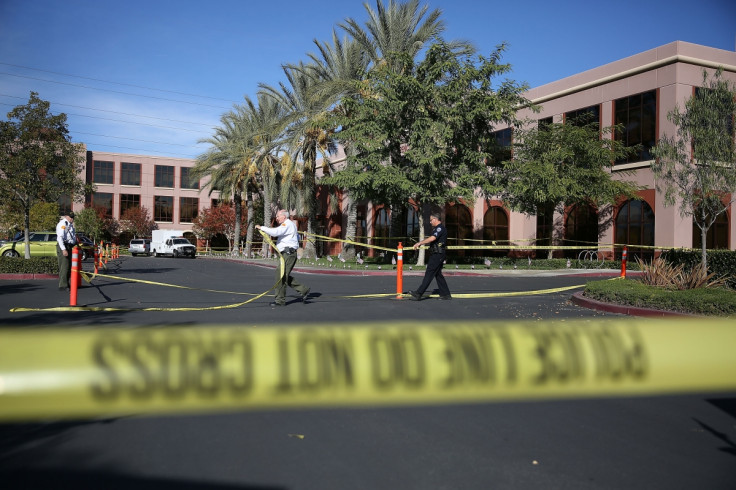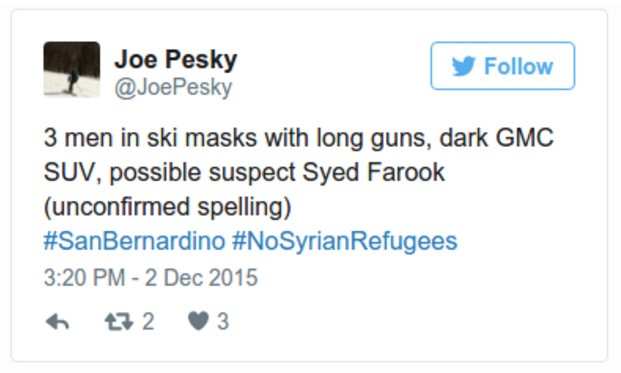John McAfee: San Bernardino shootings proved traditional media to be obsolete and irrelevant

One of the most important processes of the modern, civilized world is the spread of information. When important events occur, people look to their trusted sources of information in an effort to understand what is known and to keep informed of new developments. In the modern era, the traditional media has sought to be the trusted source for breaking news, mainly through radio and television broadcasts.
So when the news broke that a mass-shooting had occurred in San Bernardino, California on 2 December 2015 the reaction of most people was to tune into their favourite radio or TV station. They trusted that in doing so they would be on the cutting edge of breaking news – that if some new fact surfaced they would be among the first to know.
They could not be more wrong.
"The crowd-sourcing of breaking news is the first paradigm shift in modern history that actually decreases the effect of filters on the information we receive. The information comes from individuals and often direct from primary sources. It is raw, uncut, and timely."
Like most Americans, my reaction to hearing the news was to want more information. Who was involved? What was their motive? Flipping through television channels wasn't very helpful. The different channels were all just rehashing the same sketchy reports that I had already heard. So as I find myself doing more and more often, I turned off the TV and turned on the computer.
The modern internet looks nothing like the collection of static web pages we started with. In its place today is a collection of data mining tools and information feeds that any intelligence service would have killed for 10 years ago. And the number of people that know how to use these resources is growing every day.
In this case, I knew where the shooting was taking place. Knowing the locality, I could take my pick among several services and apps that allow the user to listen to live police radio broadcasts. Sure enough, by monitoring the police radio I was among the first members of the public to hear the name Syed Farook in connection with the shootings.
But other platforms that the general public is more familiar with were also ahead of the curve. The first post to Twitter that contained the name of the shooter, spelled correctly, occurred at 3:20 PM PST. According to NBC news, the first live announcement of the shooter's name occurred at 7:40 PM PST - more than four hours later.

By the time you were listening to the announcement on live TV the Twitter community had been bouncing it around for almost four hours. Other internet communities had been doing the same.
This phenomenon is not unique to the San Bernardino shootings. Recent events such as the Paris shootings and the Boston Marathon bombing all saw information hit internet platforms before reaching traditional media users.
Every day more and more people around the world become direct contributors to social media platforms. When they witness something important, their first move isn't to call NBC of FOX, it is to take out their phone and "push" the information out over their social media platform of choice. The reporting of the news, once the guarded domain of career reporters and large institutions, is now being crowd-sourced.
What is happening at the same time is that traditional media is rapidly becoming archaic, obsolete and irrelevant.
We don't need to guess what will happen next, because we've watched it happen before. The invention of television created a similar situation for newspapers, and the papers have been struggling for relevancy in the face of a declining readership.
What has happened now is traditional sources for breaking news – newspapers, radio, TV – have all been surpassed by a more efficient and convenient means of information traffic. Breaking news has found a path with less resistance than that of traditional media. And despite what members of the media set would have us believe, this is a progress and is a good thing.
The spread of information from person to person faces two major obstacles. The first is physical – how the information actually gets from one person to the next, or to many. We have seen many improvements to the solution for this obstacle, each improving over the last, and this latest shift is no exception.
The second obstacle facing information is degradation by the set of filters it must pass through as it travels to people. Biases, opinions, misunderstandings, lies, omission. All filters that affect the information we ultimately receive. Here we have seen less progress; in fact we have seen the opposite.
For what we have seen is that the larger, and more powerful, a media institution grows the greater the effect of filters has been on the information we receive through them. Modern media giants have grown so powerful that, until now, they could influence the national agenda by choosing not to report on something.
The crowd-sourcing of breaking news is the first paradigm shift in modern history that actually decreases the effect of filters on the information we receive. The information comes from individuals and often direct from primary sources. It is raw, uncut, and timely.
As more and more people clue into the fact that they can receive breaking news faster and with less censorship using tools available for all to use freely, less and less people will turn to traditional media for their news. It is not a revolution so much as evolution – the organic tendency towards the optimal path.
Who is John McAfee?
John McAfee is one of the most influential commentators on cyber-security anywhere in the world. His new venture –Future Tense Central – focuses on security and personal privacy-related products. In September, McAfee announced he will be running for US president in 2016.
McAfee provides regular insight on global hacking scandals and internet surveillance, and has become a hugely controversial figure following his time in Belize, where he claims to have exposed corruption at the highest level before fleeing the country amid accusations of murder (the Belize government is currently not pursuing any accusations against him).
McAfee was a finalist at the 2015 Comment Awards for his work for IBTimes UK.
Who is Rob Loggia?
Rob Loggia is a white hat hacker who has worked with John McAfee for many years doing research, data collection and data analysis.
© Copyright IBTimes 2025. All rights reserved.






















